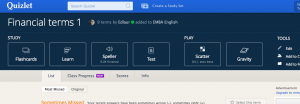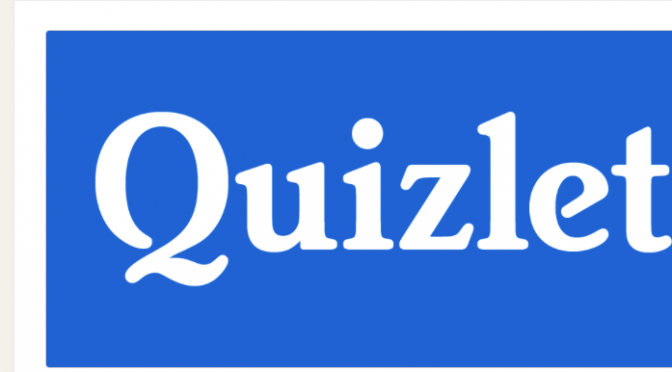Adaptive Tutoring Systems – Quizlet
I’m busy being a student again and now half way through the first year of an MA in Technology and Education with the University of Leeds. As part of the module ‘Learning with Digital Technologies’ MA, I had to reflect on my experiences with different tools and learning theories. So I thought I’d share my thoughts on the flashcard tool Quizlet.

Quizlet allows you to create flashcards, games and quizzes which can be used to learn vocabulary, definitions, historic dates and so on. Progress is assessed automatically, giving students feedback as they make their way through the activities.
After logging in for the first time, I typed ‘English’ in the search function and found numerous flashcard sets, created and shared by users. Many consisted of image and word combinations suitable for lower ability levels. Others sets such as ‘Junior College English Vocab’ contained words like nebulous, fetters and truculent, which would be too advanced for most ESL (English as a Second Language) students. Many sets were simply titled English and, although hovering over the title presents a view of the contents, it was often unclear what the connection between the words was. Without proper naming or tagging conventions to clearly identify the target group and type of the vocab, finding suitable sets to practice with is time-consuming and I feel this reduces the value of the set sharing function.
However, when I started practicing with a flashcard set I found the tool to be very engaging and was impressed by clever additions such as the option to listen to the words, the choice of displaying either the term or the definition first and also the fact that tests can be printed. The games are timed and once your score is revealed, you are encouraged to repeat the activity to beat your time and improve your position on the score board. Motivating messages, such as ‘Yipee, you beat your previous record’, are also given.
Having assessed Quizlet from a learner’s standpoint, I followed the steps to create a set of flashcards on English financial terms with definitions. This was very easy and, as the tool gives you the option of importing your own lists, very quick.
Quizlet does not ‘teach’ the user, being limited to simple repetition of words to help memorise spelling and meaning. However, I feel the key to its appeal is the individualisation aspect, as students can choose the type of activity they want to try and can repeat it as many times as they want, therefore defining the pace of the progress.
I had heard of Quizlet prior to this, but had assumed it would not be suitable for advanced-level adult learners. I worried they would see it as game-like or frivolous, and I also felt that prescribing lists of words for students to learn goes against the type of student-centred learning I try to practice. Having to try out different tools as part of the MA course has made me aware of the need to reflect on my own bias or preference regarding learning strategies, and now having tried Quizlet, I feel that, ironically, the tool I dismissed as being too teacher-centred could have great potential in a constructivist classroom. Allowing students to choose the vocabulary and definitions they want to practice or encouraging them to create sets themselves, which they could then share with classmates, would give them a central role in the learning process.

